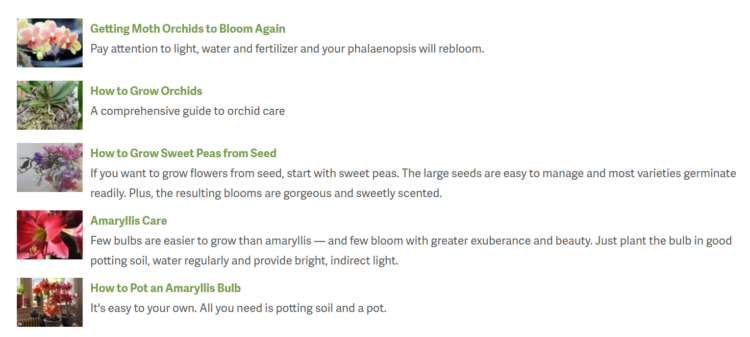- What trends will dominate the gardening industry in 2020,
- How to cope with seasonality,
- Which SEO activities and elements are particularly important in this industry.
Trends That Will Dominate The Gardening Industry in 2020
Nowadays people strive to get close to nature. According to GardenResearch.com, last year 30% of households decided to buy at least one house plant. The boom is also easily noticeable on various social media platforms such as Pinterest where the number of search queries related to plants increased by 90% over the last year! Although our modern world is dominated by technology, people want to be close to nature. Ecological trends are more and more far-reaching and concepts like “zero waste” or “upcycling” are gaining in popularity. What’s more, the awareness of consumers also increases and they tend to select companies that rely on ecological solutions already at the stages of production or designing packaging. Young people called Millennials play a key role in the process of online shopping as they affect methods of searching for plants and buying them. That’s why owners of gardening e-stores should strive to make their websites as effective and efficient as possible. The so-called happiness economy is another dominant trend that has a great impact on the gardening industry. Customers struggle to improve the quality of their lives, affected also by the level of satisfaction with spaces around them. Product categories related to irrigation, swimming pools, substrates, fertilizers, grasses, and tools recorded dynamic sales growth in 2019. Obviously we can’t forget about the current situation caused by the pandemic which strongly influences the gardening industry. Various trade fairs, conferences, exhibitions and other events across the world had to be called off. Moreover, due to the imposed restrictions, customers aren’t particularly interested in buying plants in the traditional way. Therefore, if you run a gardening online store, this is a perfect and necessary time to focus on your website and ensure that users can safely place orders online. Some horticulturalists predict that online sales of potted, balcony, or ornamental plants will increase as people forced to give up their summer holiday plans are likely to devote more time to their close surroundings. So what is the takeaway for gardening business owners? The importance of the e-commerce sector will undoubtedly increase over time, moreover, business owners who want to be prosperous should adapt to modern customers as quickly as possible. Additionally, it’s worth spending some extra time to ensure that your product range offers only unique, diverse and top-notch plants.
How To Cope with Seasonality In The Gardening Industry
The gardening industry perfectly reflects the nature of seasonal business. It means that there are months when gardening stores generate great profits and the so-called low seasons when revenues are rather small. The chart below shows the seasonality of a website operating in the gardening industry, keyword potential in particular months, and deviation from the average. How to properly perform SEO activities in an industry characterized by such high seasonality? The task isn’t the simplest, however, remembering about a few basic principles will ensure the success of your online store!- The SEO process should be conducted throughout the whole year as proper activities can increase the visibility of the website from month to month. Starting the work much earlier ensures that the site will be visible on Google during the peak of the season which consequently contributes to increasing traffic and revenues of the company.
- Consider running a company blog where you can publish articles tailored to a particular season and discussing given aspects of the industry. The blog allows you to improve the topical authority of the domain, whereas linking particular products in your blog posts helps to increase the site’s visibility and at the same time redirects potential customers right to product pages.
- Analyze what phrases are likely to be searched for at specific times of the year and tailor your keywords to the season. During winter gardening stores may focus on keywords related to houseplants, spring is perfect for promoting tools and fertilizers, while in autumn it’s best to focus on products protecting plants against frost.
SEO For The Gardening Industry - What To Focus On?
How to do SEO for your gardening store?Below you can find a list of a few important elements that are certainly worth implementing on every website.Keywords - H0w Users Search the Internet?
Before conducting any SEO activities on a website, it’s worth analyzing keywords on which it’s displayed in the search results as well as phrases used by people browsing the net. Keywords Google Planner and Google Search Console are two very popular tools helpful in selecting appropriate keywords. When it comes to industries with high competition, it’s a good idea to go for long-tail SEO based on longer, more detailed and less competitive phrases that significantly facilitate the path to reaching top 10 in the search results. Long-tail SEO makes it possible for smaller and less recognizable companies to compete with the greatest market tycoons for high positions in SERPs.SEO Must-Haves For Every Website Owner
Let’s start with title tags. They ought to be up to 60 characters long. Due to the fact that titles are displayed in the search results, it’s important to make sure that they contain keywords that accurately describe the site. Meta descriptions are another fundamental element. They’re also displayed in the search results and, as the name itself suggests, describe the website. They shouldn’t be longer than 150-160 characters. Although meta descriptions don’t have a direct impact on positions on Google, they can encourage users to enter particular sites. Headers are another necessary element of every properly optimized website. Each subpage should contain 1 H1 header and at least 2 H2 headers. Moreover, don’t forget about H3-H6 headers. Make sure that your headers are optimized for appropriate keywords. Below you can see an exemplary heading structure on a website:
Headers are another necessary element of every properly optimized website. Each subpage should contain 1 H1 header and at least 2 H2 headers. Moreover, don’t forget about H3-H6 headers. Make sure that your headers are optimized for appropriate keywords. Below you can see an exemplary heading structure on a website:
 Properly designed menu and page footer are also essential for proper website operation. Thanks to them, website navigation is noticeably easier and more user-friendly. If you want to find out how to improve your website’s navigation, go to our previous blog entry.
URLs. As a rule of thumb, URLs should be up to 115 characters long and they should contain correct "-" separators. Double-check whether your store’s address doesn’t include any undesirable characters like underscores or capital letters. Moreover, URLs need to be placed in proper catalogues. An exemplary link to a given service on your offer needs to look like this: https://website-address.com/offer/service.
Properly designed menu and page footer are also essential for proper website operation. Thanks to them, website navigation is noticeably easier and more user-friendly. If you want to find out how to improve your website’s navigation, go to our previous blog entry.
URLs. As a rule of thumb, URLs should be up to 115 characters long and they should contain correct "-" separators. Double-check whether your store’s address doesn’t include any undesirable characters like underscores or capital letters. Moreover, URLs need to be placed in proper catalogues. An exemplary link to a given service on your offer needs to look like this: https://website-address.com/offer/service.
Remember that Content Is King!
In most industries, including the gardening one, content is one of the key elements of the SEO process. Make sure that your descriptions are unique and see how to create attractive product specifications. When creating your website content, focus on basic SEO principles. The description should include at least 2 H2 headers optimized for keywords, <strong> and <em> tags, and internal links that are really crucial. [caption id="attachment_25534" align="aligncenter" width="750"] source: https://www.gardeners.com/[/caption]
Posting regularly on your company blog is another SEO must-have. Publish at least 4-5 entries a month to increase valuable traffic to the site and the number of keywords your store is displayed on. A blog is a perfect solution for the gardening industry as users frequently search the net for useful tips and pieces of advice on growing plants.
source: https://www.gardeners.com/[/caption]
Posting regularly on your company blog is another SEO must-have. Publish at least 4-5 entries a month to increase valuable traffic to the site and the number of keywords your store is displayed on. A blog is a perfect solution for the gardening industry as users frequently search the net for useful tips and pieces of advice on growing plants.
Social Media
Probably no one needs to be convinced that nowadays being active on social media is a must if you want to attract customers. Moreover, social media platforms are a perfect means for obtaining quality links to the site. When it comes to the gardening industry, it’s worth ensuring that your posts and photos are attractive and unique. Focus on platforms like Facebook, Instagram or Pinterest. [caption id="attachment_25538" align="aligncenter" width="568"] Source: https://www.facebook.com/YouGardenUK/[/caption]
Source: https://www.facebook.com/YouGardenUK/[/caption]
Link Building
Off-site activities are equally important as all actions performed on the site. Focus on building quality links leading directly to your store as they will improve not only the site’s parameters analyzed by Google but also the credibility of your domain. These two elements have a significant impact on the positions on which websites are ranked in the search results. Be active on social media and forums, create the so-called NAPs, meaning online business cards of your company. Learn how to recognize quality links and focus on obtaining them!Local SEO
If you own a company operating in the gardening industry, consider doing local SEO which will allow you to effectively attract new potential customers. Set up and optimize your Google My Business listing. It should include information such as: opening hours, exact address, contact details, as well as the option to add customer reviews. Don’t panic if you aren’t sure how to create a perfect Google My Business listing. You can find detailed tips and guidelines in one of our blog entries. You’re welcome!











